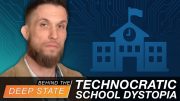In true Communist fashion, the Chinese government is using dishonest and underhanded tactics — and lots of money — to influence both perception and public policy in the United States. One of the the Red Dragon’s favorite tactics is using Chinese student groups to do the bidding of the Communist government.
In a recent report, Foreign Policy exposed the ways the Chinese government funds student groups and directs their actions and cites several examples, based on messages and records reviewed by Foreign Policy, as well as interviews with Chinese students, who “requested anonymity for fear of potential reprisals.” One of the examples cited in the article is of Chinese President Xi Jinping’s September 24, 2015 visit to the United States. Xi visited business and tech leaders in and around Seattle, Washington, before heading to a state dinner with President Obama at the White House. But those were not the only honors shown to Xi during his visit. As the article explains:
When Chinese President Xi Jinping visited Washington on Sept. 24, 2015 on a state visit, hundreds of Chinese students lined the streets for hours, carrying banners and flags to welcome him. It was a remarkable display of seemingly spontaneous patriotism.
Except it wasn’t entirely spontaneous. The Chinese Embassy paid students to attend and helped organize the event. Working with Chinese Students and Scholars Associations (CSSAs) at local universities — a Chinese student organization with branches at dozens of schools around the country — government officials from the office of educational affairs at the Chinese Embassy in Washington collected the contact information of about 700 students who had signed up to attend. Embassy officials communicated with students via WeChat, a Chinese messaging app, during the event and into the night, responding to messages as late as 3 a.m.
Each of those students was paid $20 for lining the streets, waiving prepared banners and flags, and praising the Communist leader. This is similar to other events, such as in 2012 when Xi visited Washington as vice chairman, and the year before when then-President Hu Jintao visited Chicago. Students were paid for their participation on those occasions, as well. In fact, the University of Wisconsin-Madison CSSA bused in Chinese students for the Chicago visit.
This practice is widespread and routine. The article says that “CSSAs regularly accept funds from their local consulates and many officially describe themselves as under the “guidance” or “leadership” of the embassy.” Furthermore:
Internal correspondence reviewed by FP also show that consular officials communicate regularly with CSSAs, dividing the groups by region and assigning each region to an embassy contact who is responsible for relaying safety information — and the occasional political directive — to chapter presidents. A few CSSAs explicitly vet their members along ideological lines, excluding those whose views do not align with Communist Party core interests.
So these CSSAs act essentially as cells of the Communist Party of China. This goes a long way toward explaining FBI Director Christopher Wray’s February 13 statements to the Senate Intelligence Committee that American universities are naive about the intelligence risk of Chinese “nontraditional collectors, especially in the academic setting” and that China poses a “whole-of-society threat.”
Wray’s remarks sparked several Georgetown University student representatives to write an open letter to the university president, asking the school to disavow Wray’s statements and calling the comments a “witch-hunt” and a “McCarthyist craze.”
As an aside, isn’t it just like a Communist group to trot out the idea of McCarthyism when their communist plans are laid bare? And — just to put in the for-what-it’s-worth column and to clear the good name of Joseph McCarthy one more time — while his name has become a byword for overreaction and baseless persecution, every single person McCarthy ever accused of being a communist was later shown to be just that. Just check the Venona papers for some examples.
The article also quotes Bill Bishop, who writes the Sinocism newsletter. Bishop says that Chinese Communist Party influence within the United States “should be transparent and it should be disclosed” but disagreed with what he saw as Wray’s “over-broad and unspecific language” that painted all Chinese people with the same brush.
Of course, while Bishop may feel that Wray’s comments were “over-broad and unspecific,” Bishop’s own statement that Chinese Communist Party influence within the United States “should be transparent and it should be disclosed” is a milquetoast example of refusing to recognize and address a threat when he sees one.
The truth is that communism is never “transparent” or “disclosed” until it has a stranglehold on a nation.
A good example of that can be seen in what happens when a Chinese student refuses to praise the communist government. In May 2017, Shuping Yang, a graduating student at the University of Maryland, gave a commencement speech. Using the comparison between the air quality in the U.S. to that in China as a metaphor for the difference between freedom and tyranny, Yang concluded her speech with:
Democracy and free speech should not be taken for granted. Democracy and freedom are the fresh air that is worth fighting for. Freedom is oxygen. Freedom is passion. Freedom is love. And as a French philosopher John Paul Sartre once said, “freedom is a choice.” Our future is dependent on the choices we make, today and tomorrow. We are all playwrights of the next chapters of our lives. Together we write the human history. My friends, enjoy the fresh air and never ever let it go.
Yang was immediately attacked by the local CSSA, which accused her of spreading “false statements and rumor.” When the video of her speech went viral, they posted their own video denouncing Yang.
The response of the CSSA is not merely a matter of academic freedom or even competing ideas; it was by design. As the Foreign Policy article says, “Embassy officials have also coached CSSAs how to respond during a public relations crisis.” The article goes on to say:
Shortly after the incident, an embassy official met with CSSAs from 14 schools from states near the Washington metro area, including the University of Maryland CSSA. In the meeting, the official praised the group’s response and encouraged other CSSAs to follow suit, according to typed notes from the meeting reviewed by FP. The official recommended that CSSAs, if faced with a similar crisis, should contact the embassy as soon as possible and provide a detailed report, issue a public statement immediately, comply with U.S. laws, and avoid violence and personal attacks.
So, the official recommendation to CCSAs from the embassy when a situation (“crisis”) arises where a Chinese student studying in the United States praises the freedoms she enjoys here and calls for those same freedoms to be enjoyed at home is for CSSA members to contact the embassy as soon as possible and provide a detailed report and make a public statement disavowing the freedom-loving student.
Thankfully, the CSSA’s response was not all there was to this story. When Yang finished her remarks, she was joined at the lectern by Wallace Loh, president of the university. With tears in his eyes, he called her speech “most inspiring” and said, “Like you and your parents, I also am an American by choice, and you have expressed some of the deepest feelings I feel for this country — why this is, and will always be, a shining city on a hill.”
In her speech, she said that “the fresh air of free speech” in America was something she was surprised by, adding, “I have learned the right to freely express oneself is sacred in America.” Of course, if the influence of communism continues to gain ground, Yang may find that here, as she said is the case in China, “only authorities own the narrative.” Watch the speech here (it begins at the 41:30 mark). You will likely see why President Loh had difficulty keeping his emotions in check.





